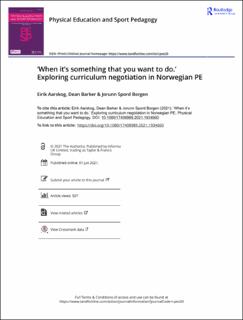| dc.contributor.author | Aarskog, Eirik | |
| dc.contributor.author | Barker, Dean | |
| dc.contributor.author | Borgen, Jorunn Spord | |
| dc.date.accessioned | 2021-11-08T09:12:31Z | |
| dc.date.available | 2021-11-08T09:12:31Z | |
| dc.date.created | 2021-06-29T12:42:45Z | |
| dc.date.issued | 2021 | |
| dc.identifier.citation | Aarskog, E., Barker, D., & Spord Borgen, J. (2021). ‘When it’s something that you want to do.’ Exploring curriculum negotiation in Norwegian PE. Physical Education and Sport Pedagogy, 1-14. | en_US |
| dc.identifier.issn | 1740-8989 | |
| dc.identifier.uri | https://hdl.handle.net/11250/2828284 | |
| dc.description.abstract | Background: Student participation in curriculum negotiation has been widely regarded as beneficial for student engagement, motivation, and learning. Within the physical education (PE) context however, several scholars claim that these benefits are seldom realized. Interestingly, most investigations into curriculum negotiation in PE focus on teacher actions and behavior. Investigations of students’ actions in curriculum negotiation are rare. Further, while much of the literature claims curriculum negotiation is potentially beneficial for student learning, few of the conceptual and analytical frameworks utilized within previous PE literature are based on explicit learning theories.
Purpose: The purpose of this paper is to explore student participation in curriculum negotiation in Norwegian PE through the lens of an explicit learning theoretical perspective.
Method: A 10th grade class with 23 students (age 15–16) and an 8th grade class with 30 students (age 13–14) from 2 different schools, and their respective teachers were recruited for the project. Within these classes, participatory observation, video observations, and stimulated recall interviews were conducted to produce empirical material related to curriculum negotiation. The material then underwent qualitative thematic analysis where select parts of John Dewey’s educational philosophy were used as the analytical framework.
Results and discussion: With a basis in the analytical framework developed from Deweyan educational philosophy, the results show that students within the two contexts participate in both explicit and implicit forms of curriculum negotiation. Explicit curriculum negotiations to a large degree appear to be governed by the teachers and are deemed by teachers to be part of strategies for upholding Norwegian legislations and recommendations for including students in curricular decision-making. While not as easily noticeable, implicit forms of negotiations were more prominent within the explored contexts. The analysis also suggests that from a Deweyan perspective, possibilities to increase learning through curriculum negotiations occur when teachers notice, help, and guide students in their own reflective processes surrounding how to act in PE. Such pedagogical action makes implicit negotiations occurring more explicit, and explicit negotiations more intelligent. | en_US |
| dc.language.iso | eng | en_US |
| dc.rights | Attribution-NonCommercial-NoDerivatives 4.0 Internasjonal | * |
| dc.rights.uri | http://creativecommons.org/licenses/by-nc-nd/4.0/deed.no | * |
| dc.title | ‘When it’s something that you want to do.’ Exploring curriculum negotiation in Norwegian PE | en_US |
| dc.type | Peer reviewed | en_US |
| dc.type | Journal article | en_US |
| dc.description.version | publishedVersion | en_US |
| dc.rights.holder | © 2021 The Author(s). | en_US |
| dc.source.pagenumber | 1-14 | en_US |
| dc.source.journal | Physical Education and Sport Pedagogy | en_US |
| dc.identifier.doi | https://doi.org/10.1080/17408989.2021.1934660 | |
| dc.identifier.cristin | 1919293 | |
| cristin.ispublished | true | |
| cristin.fulltext | original | |
| cristin.qualitycode | 1 | |

